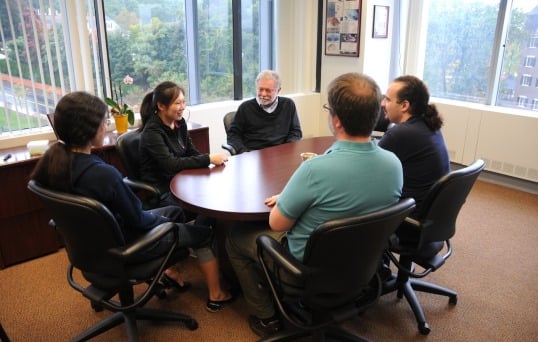 |
|
| Charles Emerson, PhD, center, meets with Wellstone Center colleagues, from left, Chi Yan, graduate student; Charis Himeda, research associate; Alec DeSimone, postdoctoral fellow; and Jim Windelborn, postdoctoral fellow. |
A new cooperative research center focusing on one of the most common muscular dystrophies has been established at UMass Medical School. The Wellstone Muscular Dystrophy Cooperative Research Center will focus its research and training programs on facioscapulohumeral muscular dystrophy (FSHD), one of the most prevalent myopathies afflicting both children and adults. According to Center Director Charles P. Emerson Jr, PhD, professor of cell & developmental biology and neurology, there are currently no clinical trials of novel therapeutics for FSHD ongoing in the U.S. because of a lack of relevant preclinical data to direct development of therapeutic targets to disease mechanisms. The Wellstone Center seeks to change that.
“FSHD leads to severe muscle weakness and our center's therapeutic approaches will focus on development of drugs that target disease genes, as well as drugs that improve muscle strength,” Dr. Emerson said. “The therapeutic approaches being developed by our center will have broad application to the treatment of other muscular dystrophies and other debilitating medical conditions of muscle weakness including aging, muscle injury and confined bed rest.”
“The new partnership between the Wellstone Center and other translational research groups at UMMS, such as the Department of Neurology and the Gene Therapy Center, have given the programs another opportunity to bring their unique talents to bear on a vexing clinical problem,” said Terence R. Flotte, MD, executive deputy chancellor, provost and dean of the school of medicine. “This is an important addition to the translational research enterprise.”
The UMMS Wellstone Center is one of six funded by the National Institutes of Health, with additional funding from foundations and individuals. These centers engage in translational research with patients and industry to develop novel therapies for muscular dystrophies—genetic diseases resulting in the degeneration of muscle or muscle function. A 2001 federal law directed the NIH to establish centers of excellence for research on muscular dystrophy. The program was subsequently named in honor of the late Senator Paul D. Wellstone of Minnesota, a champion of muscular dystrophy research.
The UMMS center’s mission also includes training the next generation of muscular dystrophy clinical and basic researchers, and providing the broader research community with biomaterials for muscular dystrophy research. Currently, the UMMS Wellstone Center has ongoing research projects that define molecular and imaging biomarkers of FSHD muscle disease and identify therapeutic targets for pre-clinical studies using novel mouse models developed by the center to develop drugs for FSHD clinical trials.
Emerson and colleagues join UMMS from the Boston Biomedical Research Institute, which previously hosted the Wellstone Center research program.
An important new initiative for the center will be the establishment of an FSHD clinic, which will serve patients in the region and enable them to participate in research and clinical trials. The center will host a patient meeting in November, details of which may be found UMass Chan Wellstone website.
Additionally, the center supports an education and training core that will oversee a pre- and postdoctoral fellowship program designed to mentor young scientists for careers in skeletal muscle and muscular dystrophy research, with a strong focus on multidisciplinary training for FSHD and muscle disease research, providing trainees with direct contact with patients with the disease. A cell core laboratory, with a tissue and cell repository of muscle stem cells and muscle biopsies will be available worldwide to FSHD investigators to test new therapeutics with biotech partners and to use the power of computational biology and genomics to establish a FSHD muscle biomarker database.
An especially innovative aspect of the Wellstone Center at UMMS is the work of Daniel P. Perez, who is president of the FSH Society, a patient advocacy group that supports research into FSHD and educational efforts for patients, families and other constituencies. Perez works with Wellstone Center leadership on the center’s website and communications, organizes patient/researcher meetings and workshops, and works with patients and families to provide education and support for their participation in the cell core database. The partnership between patients and their families and center scientists and clinicians and industry will be essential for the center to successfully carry out its mission to develop therapies for FSHD and other debilitating muscle diseases.